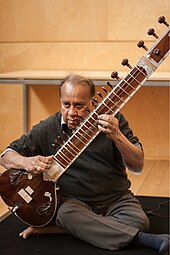Subroto Roy Chowdhury
Subroto Roy Chowdhury (born January 29, 1943 in Calcutta ; † May 22, 2017 in Berlin ) was an Indian sitar player of classical North Indian music , which he performed in the traditional Dhrupad style, mainly the Jaipur-Senia- Gharana , and in performed lighter khyal style. In addition to Calcutta, Chowdhury had a residence in Berlin. He gave concerts regularly, especially in Germany and other European countries.
Career
Chowdhuri went to an English mission school in Calcutta and received his first sitar lessons at the age of 13 from Nirmal Chakravarty. His later teachers taught him in the now popular khyal and in the stricter tradition of the older dhrupad. They included the Dhrupad master Birendra Kishore Roy Chowdhury (around 1901–1972), who played Rudra Vina , Sursingar and Seni Rabab. The last two lute instruments are combinations of Saraswati Vina and Afghan Rubab that have almost disappeared . Other influential dhrupad teachers at the time were the singer Nasir Aminuddin Khan Dagar, where Chowdhuri was accepted as a disciple of the Gharana in a formal ceremony (ganda bandhan) , and the sarod player Radhika Mohan Maitra (1917-1981). The families of the last three musicians named come from East Bengal , today's Bangladesh . In Calcutta, Aminuddin Dagar and his brother Moinuddin Dagar were the leading representatives of the classical Senia-Gharana in the Dhrupad tradition, which goes back to the Mughal court musician Tansen . Chowdhury later took lessons in the West Indian sitar school of the Jaipur- Senia-Gharana with Bimal Mukherjee, who was its leading representative at the time.
In 1964 his career began in front of the Kolkata audience. Several awards followed at music competitions on the state broadcaster All India Radio . In 1969 he received the title Surmani at a music festival in Mumbai . He has been touring Western Europe regularly since the 1970s. He has been invited to festivals by broadcasters in Germany, France, Switzerland and Great Britain. Chowdhuri appeared at the North Sea Jazz Festival in The Hague, the Tübingen Jazz and Classical Days , the Berlin Festival and in Ljubljana . At the invitation of Ali Akbar Khan College , he played in the USA . In 1977 Chowdhury was voted Musician of the Year in India.
In 1998 and 2001, together with the tabla player Saibal Chatterjee, he led a workshop for Indian music at the Liszt School of Music Weimar . In Calcutta he gave private music lessons. His daughter Sohini Roychowdhury is a Bharatanatyam dancer.
Style of play
Chowdhuri's way of playing a slowly developing alap , the non-metric opening part of a raga and the subsequent meditative iodine, in which the plucked drone strings of the sitar form a rhythmic structure, comes from Birendra Kishore . In Chowdhuri's sitar playing, his preference for the 19th century dhrupad with the soft sounding tone sequences of the vina and rubab is evident. In India he is considered a progressive traditionalist.
Chowdhury often played the raga bhairav at morning concerts, a morning raga that is considered very old and creates a meditative mood. Raga Jaijaiwanti or the very old Raga Shree, whose strict structural framework is particularly difficult to design, are seldom heard and little known. Here Chowdhury brought in his clear and fine melody playing, whereby he can become extremely fast and virtuoso in improvising ornamentation ( gamak ) .
In addition to classic Indian ragas, Chowdhuri also played western-eastern fusion music with jazz musicians . On the album Explorations, which was recorded in 1987 at the Bauer recording studio in Ludwigsburg , he can be heard in three compositions with soprano saxophonist Steve Lacy . In 2001 Chowdhury went on a concert tour with the adventurous Chinese Guzheng player Xu Fengxia and the tabla player Saibal Chatterjee.
Discography
- Calcutta meditation. With Asit Pal (tabla). Enja Records 1983
- Serenity. With Manikrao Popatkar (tabla). India classics jazzpoint, Stuttgart 1986
- Exploration. With Steve Lacy (soprano saxophone) and Shibsankar Ray (tabla). India classics jazzpoint, Stuttgart 1987
- Meditation raga. Sitar solo in Kaushiki Canada. India classics jazzpoint, Stuttgart 1987
- Music for meditation. With Asit Pal (tabla) .Nataraj Music, Düsseldorf 1988
- Raga Malkauns. With Asit Pal (tabla). Nataraj music, Düsseldorf 1988
- Colors of India. With Asit Pal (tabla). Autograph, Nottuln
- Morning Raga Ahir Bhairav. With Asit Pal (tabla). India classics jazzpoint, Stuttgart 1993
- The Indian Sunset. With Saibal Chatterjee (tabla). India classics jazzpoint, Stuttgart 1996
- The Indian Sunset. With Saibal Chatterjee (tabla). India classics jazzpoint, Stuttgart 1998
- From Dusk to Dawn. With Saibal Chatterjee (tabla). Hindusthan Records 2001
- Sanjog. Jugalbandi with Madhuri Chattopadhyay (violin) and Sankha Chatterjee (tabla). Felmay, Turin (Italy) 2003
- Morning ragas. With Saibal Chatterjee (tabla). Hindusthan Records
- Sunrise. With Saibal Chatterjee (tabla)
- Sympathy. With Sanjib Pal (tabla). Bihaan Music, Calcutta 2009
Web links
- Sitar player dies. The Telegraph, May 30, 2017
Individual evidence
- ↑ biography on his homepage (PDF; 8 kB)
- ↑ Priyanka Dasgupta: When Flamenco meets Bharatanatyam. The Times of India, February 3, 2011
- ^ David Courtney: Rag Bhairav. chandrakantha.com
- ↑ Played with perfection. The Telegraph, Calcutta, January 22, 2011
| personal data | |
|---|---|
| SURNAME | Chowdhury, Subroto Roy |
| BRIEF DESCRIPTION | Indian sitar player |
| DATE OF BIRTH | January 29, 1943 |
| PLACE OF BIRTH | Calcutta |
| DATE OF DEATH | May 22, 2017 |
| Place of death | Berlin |
